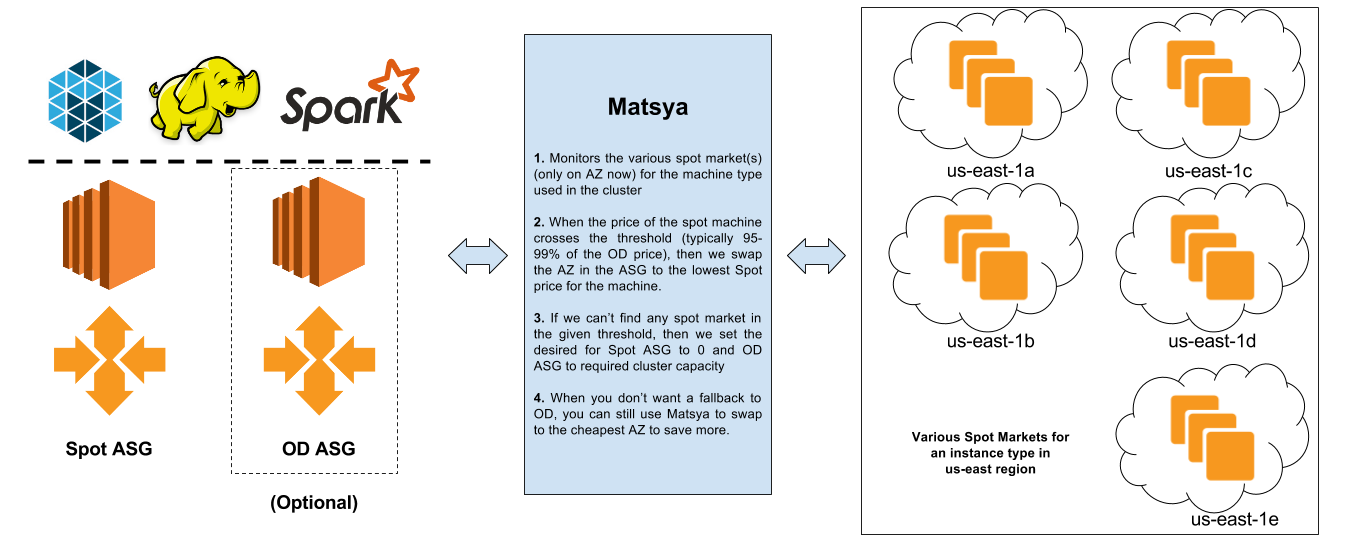Matsya is a process that helps you choose the lowest priced AZ for a machine type when running behind Auto Scaling Groups on AWS.
- You always need a fleet of machines - Hadoop / Mesos / YARN cluster requirements
- You want to save money by using Spot but also fallback to OD because you need the processing power
- Switch back to Spot once on OD to save money again.
Sample configuration would be something like
matsya {
# Path on the local FS to write the Cluster states and Time series data we create
# ${working-dir}/state and ${working-dir}/history respectively for the same
working-dir = "local_run"
clusters = [{
# Unique Identifier - Please don't change once assigned
name = "Staging Hadoop Cluster"
# AutoScaling group backing the spot machines
spot-asg = "as-datapipeline-staging-spot"
# AutoScaling grooup backing the OD machines
od-asg = "as-datapipeline-staging-od"
# Instance type that this cluster needs
machine-type = "c3.2xlarge"
# max bid price (as configured in the launch configuration)
bid-price = 0.420
# On Demand price of the Instance Type
od-price = 0.420
# maximum % of the bid price after which we should swap the AZ
max-threshold = 0.99
# This many _consecutive_ number of crossing the max-threshold
# would result in the change
nr-of-times = 3
# Should we fallback to On Demand instance if we can't find any AZ
# within the bid-price range?
fallback-to-od = false
# Subnets that're configured for each AZ
# We don't support swapping classic ASGs
# The format is availability-zone = subnet-identifier
# (you can only have 1 subnet on an AZ)
subnets = {
"us-east-1a" = "subnet-d68cfbfe"
"us-east-1b" = "subnet-2d230246"
"us-east-1c" = "subnet-2d6ef374"
}
}]
}
$ java -cp matsya-<version>.jar in.ashwanthkumar.matsya.MatsyaApp conf/matsya.conf
We've a running Hadoop Cluster whose TTs are backed by Auto Scaling Groups (ASG). In order to provide better availability of TTs to our clusters we run these across AZs. We had 2 problems that needed manual intervention
- We started incurring huge Data Transfer costs
- Once we assigned AZs to ASG we forgot about it. In our case we ended up choosing a subnet one at us-east-1c and us-east-1e. It so happened that us-east-1e had very high price flucation (close to OD price) for most of the time so we ended up paying more. We wanted to swap the machines out of a higher price AZ to a cheaper one.
Multiple AZs come with a cost - Data Transfer and variable Spot prices. Autoscaling Groups are currently limited in functionality when it comes to work with Spot machines. It doesn't support fall back to OD nor does it support spinning up the machines on the same AZ when one of the AZs has a higher price.
Spot blocks are a great step forward but our use cases where we wanted to build something which runs 24x7.
Matsya has 2 features that're missing in Spot Fleets (today)
- Automatic Fallback to OD
- Automatic fallback to a single AZ (for the entire set of nodes)
- j.mp/to-matsya - Matsya: A new Avatar, as given on Chennai Devops User meetup.
This project is being actively developed and should be considered alpha quality.
Licensed under the Apache License, Version 2.0: http://www.apache.org/licenses/LICENSE-2.0
